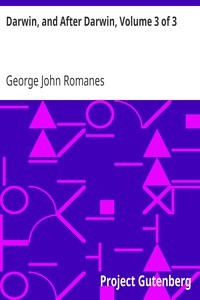Darwin, and After Darwin, Volume 3 of 3 by George John Romanes
"Darwin, and After Darwin, Volume 3 of 3" by George John Romanes is a scientific publication written in the late 19th century. This volume primarily explores post-Darwinian questions related to isolation and physiological selection in the context of organic evolution. It aims to expand on Darwinian principles, addressing new interpretations and factors that influence species differentiation and evolution beyond Darwin's original ideas. The opening of the work lays the groundwork for discussing
the principle of isolation as a key factor in the process of organic evolution. Romanes argues for the importance of isolation—both geographic and physiological—emphasizing that it can result from various factors, including breeding practices in natural and artificial contexts. He stresses that to achieve evolutionary change, particularly divergent evolution, intercrossing between populations must be limited to allow for distinct characteristics to develop, thus setting the stage for the intricate exploration of how these evolutionary mechanisms operate within natural populations. (This is an automatically generated summary.)
Read or download for free
| How to read | Url | Size | |||
|---|---|---|---|---|---|
| Read now! | https://www.gutenberg.org/ebooks/37777.html.images | 408 kB | |||
| EPUB3 (E-readers incl. Send-to-Kindle) | https://www.gutenberg.org/ebooks/37777.epub3.images | 305 kB | |||
| EPUB (older E-readers) | https://www.gutenberg.org/ebooks/37777.epub.images | 309 kB | |||
| EPUB (no images, older E-readers) | https://www.gutenberg.org/ebooks/37777.epub.noimages | 205 kB | |||
| Kindle | https://www.gutenberg.org/ebooks/37777.kf8.images | 516 kB | |||
| older Kindles | https://www.gutenberg.org/ebooks/37777.kindle.images | 476 kB | |||
| Plain Text UTF-8 | https://www.gutenberg.org/ebooks/37777.txt.utf-8 | 358 kB | |||
| Download HTML (zip) | https://www.gutenberg.org/cache/epub/37777/pg37777-h.zip | 294 kB | |||
| There may be more files related to this item. | |||||
Similar Books
About this eBook
| Author | Romanes, George John, 1848-1894 |
|---|---|
| Title |
Darwin, and After Darwin, Volume 3 of 3 Post-Darwinian Questions: Isolation and Physiological Selection |
| Note | Reading ease score: 46.6 (College-level). Difficult to read. |
| Credits |
Produced by Marilynda Fraser-Cunliffe, LN Yaddanapudi and the Online Distributed Proofreading Team at https://www.pgdp.net |
| Language | English |
| LoC Class | QH: Science: Natural history |
| Subject | Evolution (Biology) |
| Subject | Heredity |
| Category | Text |
| EBook-No. | 37777 |
| Release Date | Oct 17, 2011 |
| Most Recently Updated | Jan 8, 2021 |
| Copyright Status | Public domain in the USA. |
| Downloads | 156 downloads in the last 30 days. |
| Project Gutenberg eBooks are always free! | |


